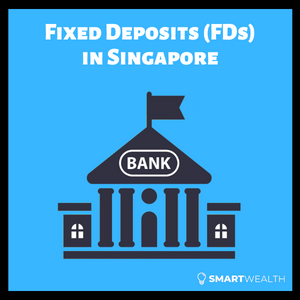Investing your hard-earned savings wisely helps you combat inflation and gain higher returns.
Maximising returns is desirable as it can help you to achieve your financial goals more quickly.
According to statistics, over half of all Singaporeans are aware of this and have investments in stock or equities. However, stock and equities are not the only way to store your wealth.
Among the variety of options available, fixed deposits in Singapore are one of the safest and easiest long-term investment instruments to understand.
If you are simply looking for a simple, passive instrument to store rather than grow your wealth, fixed deposits may be of interest to you.
What Is a Fixed Deposit Account (& How Does It Work)?
A fixed deposit, or time deposit, refers to a financial instrument that allows investors to deposit a lump sum of money. They usually gain relatively higher returns compared to regular savings accounts.
There are 3 main things to consider when evaluating fixed deposit plans.
Firstly, one should consider the tenure of the plan. This is the length of time before the investment matures, and can range anywhere from 8 months to 36 months or more. Although it is possible to withdraw your fixed deposits before maturity, this often translates to opportunity cost as you may lose out on potential interest payments.
The second factor to look at is the promised interest rate. Some fixed deposit plans offer higher interest rates when the deposit is kept for a longer period. Sometimes, the bank will also have promotional rates.
The third factor to consider is the deposit amount. Some plans have minimum deposit amounts or vary interest rates based on deposit amounts. Keeping this in mind can help you select a suitable option.
SIDE NOTE When was the last time you conducted thorough financial planning or reviewed your finances? In this day and age in Singapore, doing so will absolutely improve the quality of life for you and your loved ones. Here are 5 reasons why financial planning is so important.
The Best Fixed Deposits With the Highest Interest Rates in Singapore
There are so many available options for you to choose from. Which should you pick? Here are some of the best fixed deposits in Singapore.
DBS/ POSB Fixed Deposit
| Deposit amount | $1,000 to $19,999 |
| Tenure | 8 months |
| Interest rate | 0.6% per annum |
UOB Fixed Deposit
| Deposit amount | $20,000 and above |
| Tenure | 10 months |
| Interest rate | 0.5% p.a. |
Hong Leong Fixed Deposit
| Deposit amount | $20,000 and above |
| Tenure | 36 months |
| Interest rate | 0.9% p.a. (36 months), 0.8 p.a. (24 months), 0.6% p.a. (12 months) *Note that this is a promotional rate and may change |
Maybank Fixed Deposits
| Deposit amount | $1,000 and above |
| Tenure | 36 months |
| Interest rate | 0.6% p.a. (36 months)0.5% p.a. (24 months)0.4% p.a. (18 months) *Note that the 0.6% promotional rate is only for those who lock in their funds for the full 3 years |
CIMB Fixed Deposit
| Deposit amount | $10,000 and above |
| Tenure | 24 months |
| Interest rate | 0.8% p.a. (CIMB Preferred customers), or 0.75% p.a. *Note that this is a promotional rate that can only be enjoyed for funds locked in for 2 full years |
HSBC Fixed Deposit
| Deposit amount | $30,000 and above |
| Tenure | 9 months |
| Interest rate | 0.4% p.a. *Note that this is a promotional rate that only lasts for accounts created till November 2021 |
ICBC Fixed Deposit
| Deposit amount | $500 and above |
| Tenure | 12 months |
| Interest rate | 0.6% p.a. |
Do note that some of the interest rates listed above are promotional rates and can vary from time to time. Some banks also offer more than one type of fixed deposit account.
Apart from the ones we have listed above, there are also other banks and financial institutions offering great fixed deposit plans. You can consider looking into OCBC, RHB, Citibank and more before deciding which fixed deposit account to open.
6 Pros and Cons of Fixed Deposits
Pros
1) Higher interest rates compared to the regular bank savings accounts
One of the main differentiators between investing your money in fixed deposit accounts and parking it in regular savings accounts is the interest rate. Fixed deposits can offer between 0.2% to 1% per annum, compared to current savings accounts interest rates of 0.05%.
DID YOU KNOW? According to a survey conducted by MoneySense, about 3 out of 10 Singapore residents aged 30 to 59 had not started planning for their future financial needs. This isn't surprising because personal finance can seem complicated and daunting. But really, there are only a few things that you should focus on. Learn how to significantly improve your personal finances with the 7-step "wedding cake" strategy today.
2) No limits to how much you can put in
Fixed deposits tend to have minimum amounts but no maximum cap, or have extremely high ceilings. This is because fixed deposits are, by design, meant for large lump sum investments.
3) Protected by SDIC
The Singapore Deposit Insurance Corporation (SDIC) covers SGD held in savings or fixed deposit accounts. This means that there is extremely low risk when investing in fixed deposits. SDIC typically protects funds up to a stated amount. However, all capital and promised returns are usually more or less guaranteed.
4) Can withdraw at any time
Contrary to some’s beliefs, fixed deposits are relatively liquid. They allow for you to withdraw your funds at any time. However, it is usually discouraged because doing so prevents the person from gaining the higher returns which come towards the end of maturity.
Cons
5) Lower interest rates compared to its alternatives
Although fixed deposits offer better interest rates than savings accounts, they might not perform as well as other similar types of investments. For instance, Singapore Savings Bonds (SSBs) can provide an average return of 1.78% per year, if held over 10 years. Another option to consider can be endowment insurance plans which can provide higher potential returns. Fixed deposits carry lower risk but definitely come with lower rewards as well.
6) May not beat inflation
Even with the highest interest rates from fixed deposits, you may not be able to beat inflation, which is currently at about 1.60% per year (over the past 30 years). This can be troubling for those who are investing to save up for retirement, as the money ends up depreciating in value. This is why most people do not place all their investments in fixed deposits, instead preferring to diversify their portfolios.
4 Common Alternatives to Fixed Deposits in Singapore
Which financial instrument should you invest in? Now that you have learned more about fixed deposits, it’s time to compare between them and other alternatives in Singapore.
1) Savings Accounts
The closest siblings to fixed deposits are probably savings accounts. Savings accounts are extremely low-risk financial vehicles. Furthermore, not all savings accounts have dismal projected returns. In fact, some high-interest savings accounts can offer between 0.3% and 2% of returns. These include the DBS Multiplier, Maybank Save Up, Standard Chartered Bonus Saver and more. However, most of these have some criteria such as minimum spending or deposit amounts in order to hit the promised returns.
2) Bonds
Bonds are another relatively low-risk financial instrument you can invest in. This includes Singapore Savings Bonds (SSBs), which are backed by the Monetary Authority of Singapore (MAS). They tend to be longer-term investments compared to fixed deposits which mostly mature within 3 years.
3) Cash Management Accounts
Another alternative is to invest in cash management accounts, or CMA for short. Currently, the most popular CMAs in Singapore are Stashaway Simple and Syfe Cash+. Cash management accounts are usually offered by financial institutions such as brokerages and investment platforms. They carry slightly higher investment risk because the underlying investments are typically into bond funds. This also means that there is still a possibility of losing capital. However, they provide higher potential returns.
4) Endowment Insurance Plans
Endowment policies tend to lock your funds in and are less liquid than the other alternatives. They tend to have longer tenures as well. And if you surrender the plans before their maturity, you may receive lesser than what you have put in.
However, current endowment plans in the market tend to be capital-guaranteed upon maturity and can provide total potential returns higher than other similar instruments.
In Closing
Fixed deposits are great for emergency funds, as most of them tend to be highly liquid and can gain decent interest rates in a low-risk and passive way. However, it may be wise to diversify one’s portfolio instead of simply parking all of one’s funds into these types of instruments, as inflation tends to eat away at the value of the sum.
One potential route you could take is to set aside money for emergency funds and short-term goals into fixed deposits or similar options, while investing the rest. The amount you should allocate for each purpose will of course depend on your financial circumstances and risk profile as well.


